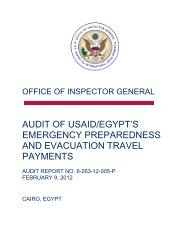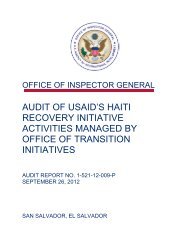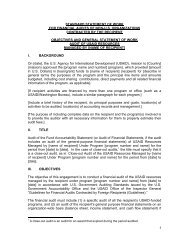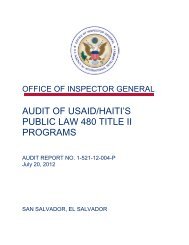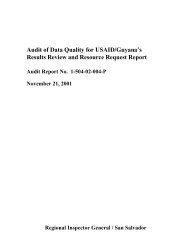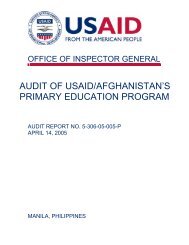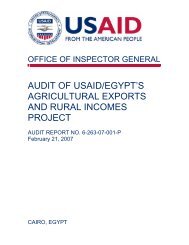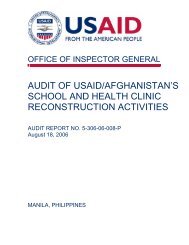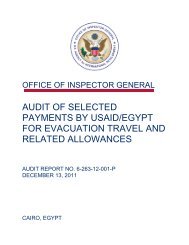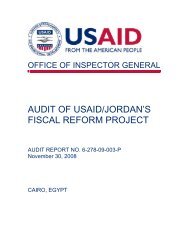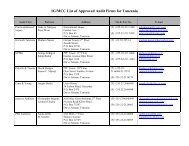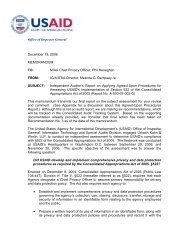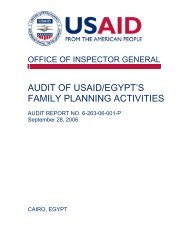USAID OIG Afghanistan and Pakistan Oversight Report, April-June ...
USAID OIG Afghanistan and Pakistan Oversight Report, April-June ...
USAID OIG Afghanistan and Pakistan Oversight Report, April-June ...
- No tags were found...
You also want an ePaper? Increase the reach of your titles
YUMPU automatically turns print PDFs into web optimized ePapers that Google loves.
delays in implementing the project. Specifically, the project undertook a laborious process toselect <strong>and</strong> train local partners before work could begin to help owners of microenterprises. Asa result, as of December 2011, only $6.6 million had been allocated to helping microenterpriseowners develop value chains.In addition, the program made little progress in developing one of its target sectors—the honeysector—because the mission took longer than expected to approve the local partner’s grantapplication <strong>and</strong> then required an additional feasibility study before proceeding. Finally,because <strong>USAID</strong>/<strong>Pakistan</strong> had not yet started tracking changes in beneficiaries’ incomes, it wasnot possible to determine whether the program was achieving its overall goal of substantiallyincreasing their incomes. The report made two recommendations to address related issues.The report made two recommendations to address these issues, <strong>and</strong> management decisionshave reached on both.Review of <strong>USAID</strong>/<strong>Pakistan</strong>’s Cost Estimates for Shipping <strong>and</strong> Storage (<strong>Report</strong> No. G-391-12-001-S, <strong>June</strong> 18, 2012). Employees transferring to <strong>Pakistan</strong> are eligible to ship personaleffects of up to 2,000 pounds by sea <strong>and</strong> 1,000 pounds by air. They are also entitled to ship onevehicle <strong>and</strong> to place items in storage. To cover the shipping <strong>and</strong> storage expenses associatedwith these transfers, <strong>USAID</strong>/<strong>Pakistan</strong> obligates an estimated amount, typically $25,000, thoughsometimes more. Mission officials did not know how their predecessors had arrived at thisestimate, so <strong>OIG</strong> conducted a review to develop a more reasonable estimate for obligatingfunds for the shipping <strong>and</strong> storage of goods for <strong>USAID</strong> employees assigned to <strong>Pakistan</strong>.By reducing the st<strong>and</strong>ard obligation conservatively to $15,000, <strong>OIG</strong> found that the missioncould put approximately $480,000 annually—or $2.4 million over 5 years—to better use. Thereport also recommended that the mission review $860,000 in unliquidated shipping <strong>and</strong>storage-related obligations for possible deobligation.In response to the recommendations, the mission reduced the st<strong>and</strong>ard shipping <strong>and</strong> storageobligation to $15,000 <strong>and</strong> completed its review of unliquidated obligations, resulting in a totaldeobligation of $653,259.As of <strong>June</strong> 30, 2012, <strong>USAID</strong> <strong>OIG</strong> had three performance audits in progress.Audit of <strong>USAID</strong>/<strong>Pakistan</strong>’s Reconstruction Activities in Earthquake-Affected Areas. Theobjective of this audit is to determine whether <strong>USAID</strong>/<strong>Pakistan</strong>’s reconstruction activities inearthquake-affected areas are being implemented effectively.Audit of <strong>USAID</strong>/<strong>Pakistan</strong>’s Assessment <strong>and</strong> Strengthening Program for LocalOrganizations <strong>and</strong> Government of <strong>Pakistan</strong> Entities. This audit will determine whether the<strong>USAID</strong> <strong>OIG</strong> <strong>Afghanistan</strong> <strong>and</strong> <strong>Pakistan</strong> <strong>Oversight</strong> <strong>Report</strong> 19



